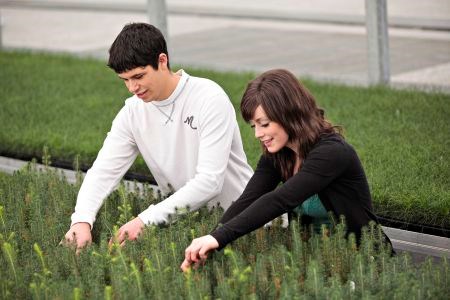A collaboration between College Boreal and Xstrata Nickel on a new experimental forest will allow for long-term planning, while providing valuable research and information-gathering opportunities about local forests.
The experimental forest, which consists of two Xstrata Nickel-owned properties comprising 2,100 acres in Capreol and Dowling in Sudbury, is the second stage of a two-phase agreement between the college and the nickel giant. The first involved the establishment of the Xstrata Nickel Biodiversity Research Centre in 2009, where a laboratory helps students develop seedlings for planting by Xstrata Nickel at its properties around Sudbury.
Having access to property where students can study the workings of a forest is invaluable, both for the hands-on educational learning and the ability to prepare the curriculum over time, said Marc Hebert, co-ordinator for the natural resources program at Boreal.
“The huge advantage of having this forest is the fact that we have a lot more flexibility in planning over the long term, which is something we didn't and couldn't have had otherwise,” he said. “We'll have long-term established plots and know that we can really monitor the forest as it changes over time.”
The two properties present very different characteristics, but each has its merits. The property near Capreol is more typically boreal forest, with black spruce, tamarack, cedar, and red and white pine, along with wetlands, ponds and a lake. The Dowling property has less water and presents as a hardwood forest, with patches of sugar maple and yellow birch.
“It's a huge advantage to have these two locations, and Xstrata Nickel has been a really positive partner in this, working with us to try to find the best locations possible,” Hebert said.
Finding those locations proved a challenge, but one the company was happy to oblige. Calling it a “no-brainer,” Marc Butler, director of regulatory affairs for Xstrata Nickel, said the agreement is mutually beneficial in that students get hands-on experience in the forest, while the company has a local source of seedlings for its ongoing reforestation program.
“We have the benefit of partnering with a group that's really progressive,” Butler said. “It's a college that's got tons of energy, they're fun to deal with and they move things along.”
The partners spent more than two years in their search, seeking out properties with abundant plant and animal diversity, locations not too far from the college and areas with road access. The properties chosen were not deemed to have a high exploration value for Xstrata, which meant that the company could explore other uses for the land.
When the first crop of students starts using the forest this fall, they'll begin by “getting to know the forest,” Hebert said, including measuring tree heights and diameters, navigating the bush with GPS units and compasses, learning different plant species and starting work on a 20-year forest management plan.
Eventually, students will undertake various research projects that indicate the health and changing characteristics of the forest. Students may study salamanders, which are bio-indicators for the health of a forest, or they may monitor species at risk. Blanding's turtles and wood turtles — both on Ontario's species at risk list — have been spotted at the Dowling property.
“We're looking at those kinds of possible things that we could be doing,” Hebert said. “What it really allows us to do is bring those students into those areas, do the work that they normally do, learn about that forest, but at the same time, gather information.”
A primary goal of the program is to build up a seed bank from various species that thrive in the area and expand the diversity of species available. Hebert suggested students could also study a process called “assisted migration” to combat the effects of global warming.
As the planet warms, tree species typically found in southern Ontario will begin to migrate north. Assisted migration would involve the planting of species that traditionally grow outside northern zones.
“We call it assisted migration because we're not letting nature do it; we're forcing their hand a bit,” Hebert explained. “That's an example of something we could do here and really monitor it over a long period of time and see what happens, if it changes.”
After nearly two years in operation, the Xstrata Nickel Biodiversity Research Centre is already proving its worth, producing between 350,000 and 400,000 seedlings a year — some are given away to schools and non-profit organizations — but the goal is 500,000.
Xstrata Nickel is receiving 65,000 of those, and Butler said he's pleased to be sourcing seedlings from a local provider, rather than bringing them up from southern Ontario. Locally grown trees are adapted to the environment, whereas trees shipped north tend to be stressed for the first few years and require extra care before taking root.
“That's not the idea,” Butler said. “The idea is to put them out there and let them go.”
Hebert, too, is excited about the possibilities the partnership offers. Ultimately, the college's goal is to equip its students with the best training possible, and employers who hire Boreal graduates are impressed with the practical knowledge the school's program provides. The experience taken from the experimental forest will offer another layer to that expertise.
“The partnership with a mining company is pretty unique, but I think it fits perfectly with a college that's in Sudbury,” Hebert said. “I think it really says a lot about who College Boreal is trying to work with.”
“I'm anxious to get this going and anxious to review, on an annual basis, where our priorities are and turn some of these kids into people that are going to benefit the environment in the long run,” Butler added. “The more you can educate younger people to the benefit of resource management, the better it's going to be for all of us.




